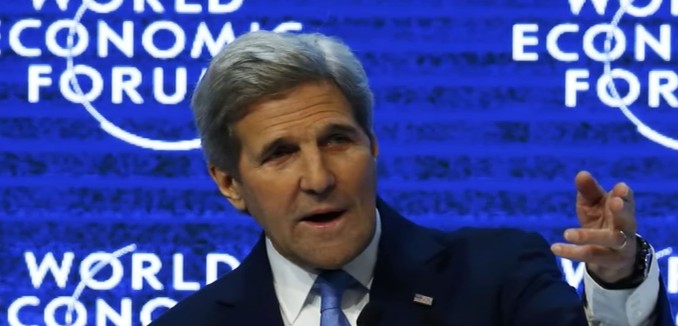Despite declarations condemning the atrocities committed by the Iran-backed regime of Syrian dictator Bashar al-Assad, Secretary of State John Kerry and the Obama administration have been “enabling…war crimes” by “offering nothing but rhetoric,” a Washington Post editorial charged on Wednesday.
The editorial noted that the U.S. and Russia managed to pass United Nations Security Council resolution 2254, which called for an immediate end to sieges and the bombing of civilians in Syria. Yet those atrocities continue: the siege of Madaya by the Iran-backed terrorist militia Hezbollah and forces of the Assad regime has led to over 50 people starving to death.
Despite the Syrian government’s continued defiance of the resolution, Kerry and UN mediator Staffan de Mistura have pressured Syrian opposition groups to attend peace talks. The U.S. and UN have denounced the ongoing atrocities, but have not “taken, proposed or even hinted at any action to force compliance by the regime of Bashar al-Assad or by Russia, which is doing much of the bombing,” the Post argued.
At the same time that de Mistura convened a new round of peace talks in Geneva earlier this week, Russian and Syrian forces stepped up their offensives, including reported attacks on “hospitals and other critical civilian infrastructure.” A shell landed in a schoolyard in Madaya, reportedly injured a number of children. The Post assessed that the Russian and Syrian offensives could be used “as leverage in the peace talks — or perhaps as a way of wrecking them.” The Assad regime refuses to negotiate with any “terrorists,” which, the Post noted, Syria and Russia seem to define “as anyone bearing arms against the regime.”
The editorial then quoted from remarks Kerry made earlier this week:
We haven’t seen a catastrophe like this since World War II and it’s unfolding before our eyes. People in Madaya eating leaves and grass or animals of one kind or another that they manage to capture. People who have not had a resupply for months. …
The Syrian regime has a responsibility – in fact, all parties to the conflict have a duty to facilitate humanitarian access to Syrians in desperate need. And this has to happen not a week from now, not two weeks, not in a month. It shouldn’t even be a bargaining chip. It ought to happen in the first days and I hope everybody here will help us to make that happen.
“Or else what?” The Post responded. “On that, Mr. Kerry has had exactly nothing to say. Expect the sieges, the bombing, the starvation — and the statements — to continue.”
The Post‘s editorial board has often criticized the Obama administration for its handling of the Syrian civil war. An editorial last May faulted the administration’s “fecklessness” for prompting groups of moderate rebels to defect to jihadist rebel groups. It argued in July that the administration had failed by targeting only ISIS but not Assad.
The Post criticized the administration a year ago for allowing Iran, one of Assad’s biggest backers, to be become a regional power. Deputy editorial page editor Jackson Diehl wrote in August that given President Barack Obama’s investment in the nuclear deal with Iran, he did not forsee the administration “challenging Iran’s Syrian land bridge to Hezbollah,” allowing Iran to continue backing Assad.
Similar criticisms of the Obama administration’s deference to Assad’s backers have also been published in other major outlets.
Steven Heydemann, a non-resident fellow at the Brookings Institution, blasted Secretary of State John Kerry in Foreign Policy on Monday for tilting toward Russia and not demanding Assad’s removal as part of the new peace talks over Syria, which “has undermined prospects for success, damaged U.S. credibility with the opposition, and further eroded America’s leverage in the Middle East.” The tilt towards Russia, Heydemann wrote, makes a peace settlement less likely and could even “spur the continued escalation of the Syrian conflict.”
Andrew Tabler, a fellow at the Washington Institute for Near East Politics, wrote last week that by accepting Iranian and Russian participation in the peace talks, the White House “created the perception that Washington is now pushing the opposition into a process where Assad will remain president indefinitely.”
Following the nuclear deal, the United States accepted Iran as a partner in the Syria talks, even though Iran never accepted the principles espoused in the Geneva Comminique of 2012, which called for a transitional government that would exclude Assad. Subsequent statements have indicated that the United States, Russia, and Iran are willing to accept Assad staying on as part of a transition, meaning, Tabler wrote, that “other candidates virtually zero chance of defeating Assad once Syria’s next presidential election is scheduled as part of the transition.”
[Photo: wochit News / YouTube ]




